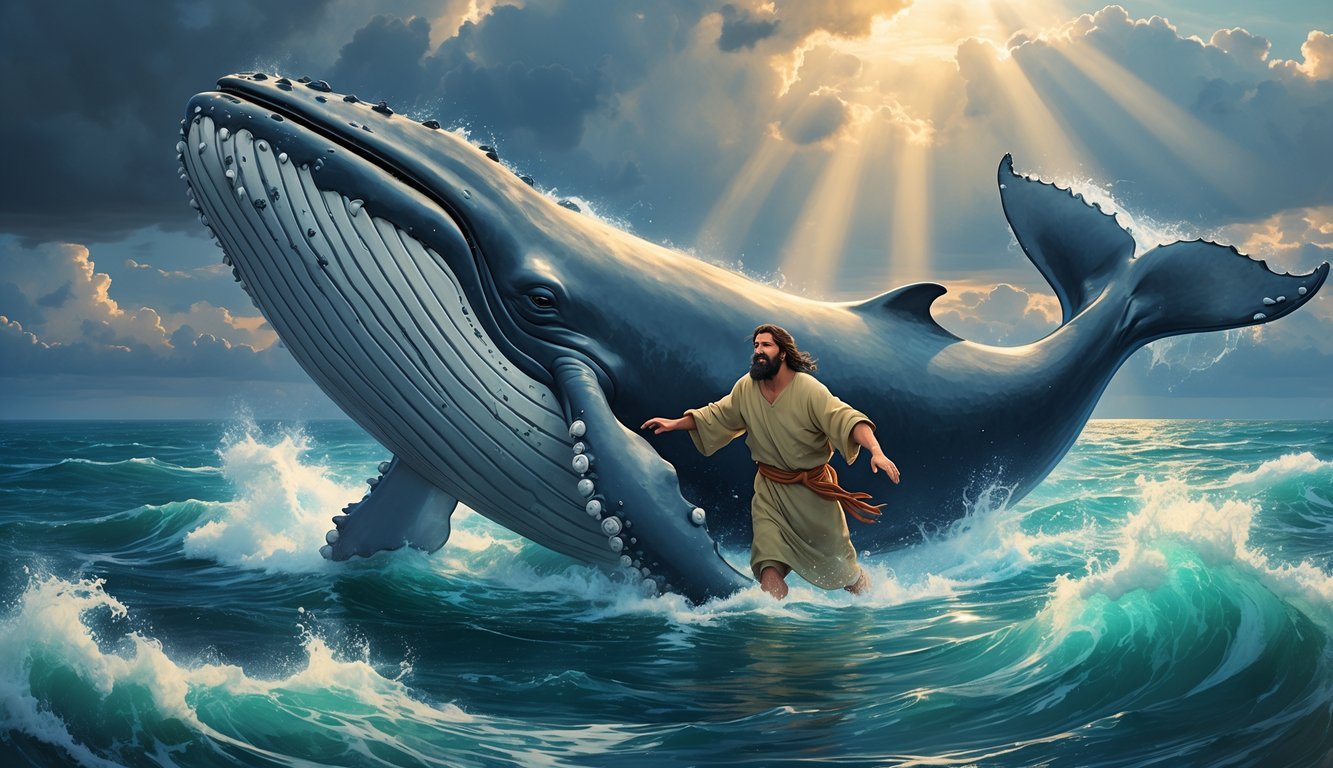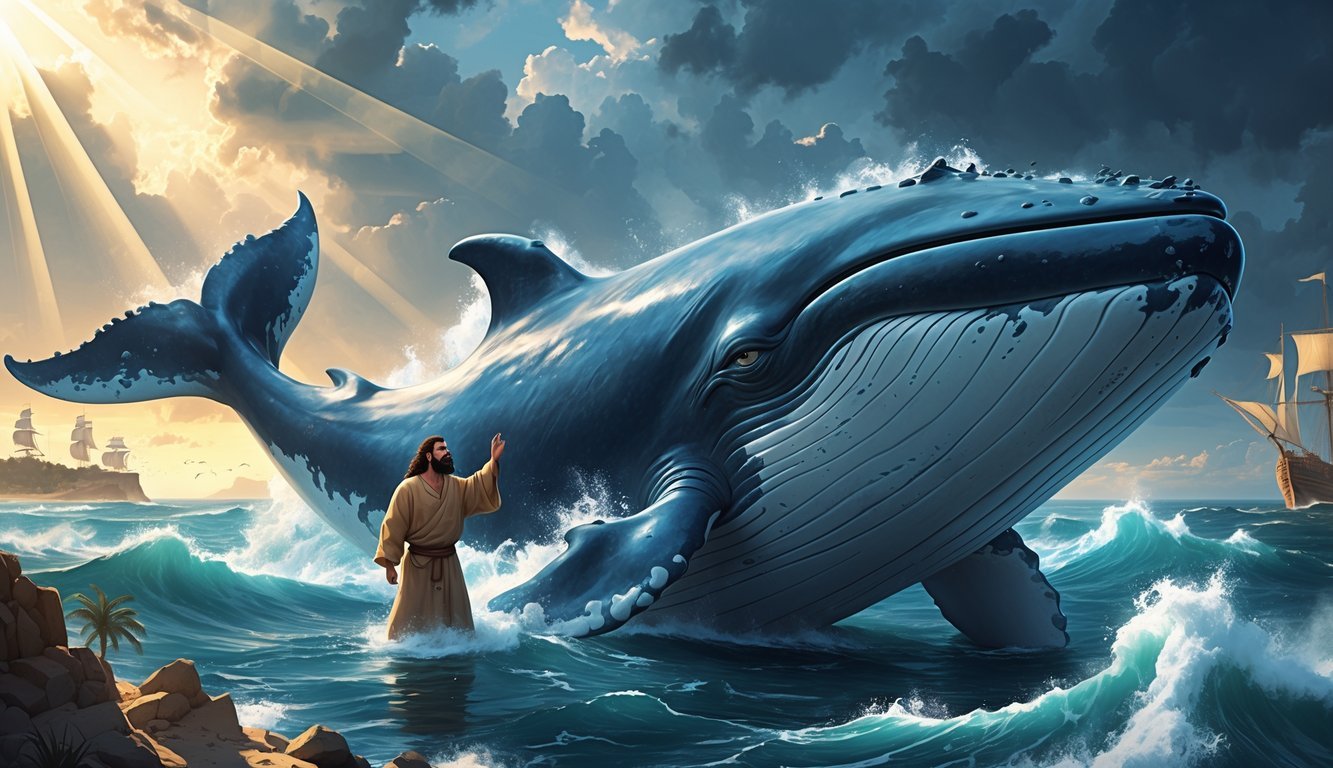PsychNewsDaily Publishers
100 Summit Drive
Burlington, MA, 01803
Telephone: (320) 349-2484
PsychNewsDaily Publishers
100 Summit Drive
Burlington, MA, 01803
Telephone: (320) 349-2484
The story features the prophet Jonah, who disobeys God, is swallowed by a fish, and ultimately learns lessons of obedience, mercy, and forgiveness in Nineveh.

The story of Jonah and the whale stands out as one of the Bible’s most memorable tales.
It’s about the prophet Jonah, who got swallowed by a huge fish that God sent, and he ended up staying inside it for three days and nights. This event comes straight from the Old Testament and shows how Jonah eventually listened to what God wanted him to do.

Ever wonder why people keep retelling this story? It’s not just a bizarre event—it’s packed with lessons about obedience, forgiveness, and mercy.
A lot of folks see it as a reminder that second chances are real, and trusting in God’s plan can change everything.
Maybe you’ve heard the story before, or maybe this is all new. Either way, there’s probably something here that’ll catch your interest.

Here’s what happened: Jonah’s mission, a wild storm at sea, getting swallowed by a giant fish, and then what went down in Nineveh. The story really shows God’s power, mercy, and how Jonah’s choices set off a chain reaction for everyone around him.
God picked Jonah, a prophet from Israel and the son of Amittai, to warn the people of Nineveh about how badly they were behaving. Nineveh, a massive city in Assyria, had a pretty bad reputation.
God told Jonah to go there and tell them to change their ways.
But Jonah didn’t want to do it. He hopped on a boat at Joppa and headed for Tarshish, trying to get as far away as possible.
He just wanted to skip out on the whole thing. This move shows how Jonah pushed back against what God asked him to do.
While Jonah sailed away, God whipped up a terrible storm.
Waves crashed, winds screamed, and the ship nearly broke apart. The sailors and captain panicked as the sea got rougher.
They begged for help and did what they could to keep the boat afloat.
They even tossed cargo overboard to lighten the load. Jonah admitted the storm was his fault and told them to throw him into the sea to save everyone else.
The sailors tossed Jonah overboard, and the sea calmed down right away.
Jonah, now in real trouble, started sinking. God sent a huge fish—some say a whale—to swallow him up.
Jonah spent three days and three nights in the fish’s belly. He prayed to God, asking for forgiveness and help.
That strange rescue gave Jonah a chance to think about his choices.
The fish spat Jonah out onto dry land.
This time, Jonah listened and went to Nineveh. He warned the people about God’s judgment if they didn’t turn away from their bad behavior.
The people actually listened. They believed Jonah and changed their ways.
Even the king got involved—he told everyone to fast, wear sackcloth, and pray for forgiveness.
Because the people repented, God showed mercy and didn’t destroy Nineveh.
Jonah had a hard time with God’s kindness toward Nineveh. The story closes with a lesson about how God’s love and forgiveness reach even those outside Israel.

Jonah and the whale isn’t just a wild story—it’s loaded with meaning from ancient times.
It reflects big ideas in both Judaism and Christianity. You can also spot its links to real places and old cultures from the ancient Near East.
In Judaism, Jonah appears in the Old Testament as a prophet called by God to warn Nineveh.
You can see Jonah struggling with God’s mercy toward enemies, which brings up themes of repentance and forgiveness.
For Christians, Jonah’s story gets another layer. Jesus mentions Jonah in Matthew 12:39-41 and Luke 11:29.
He uses Jonah’s three days in the fish as a symbol for his own death and resurrection.
Some scholars find that connection fascinating because it ties Jonah’s experience to Jesus’ mission and what he taught about forgiveness and judgment.
The city Jonah visited, Nineveh, really existed in Assyria—near today’s Mosul, Syria.
Assyria was a powerful, sometimes harsh empire in the Bible.
The story might reflect the old tensions between Israelites and Assyrians.
Ancient Near Eastern cultures, like the Babylonians, often told stories about gods who ruled the sea and controlled life.
Some experts think Jonah’s story borrows ideas from those earlier myths—like the god Ea, who ruled over the waters.
It’s interesting to see how Jonah fits into a bigger world where divine power over nature was a common theme.
| Topic | Detail |
|---|---|
| Jonah’s Mission | Prophetic call to warn Nineveh’s people |
| Biblical References | Old Testament prophet; Jesus’ Gospel links |
| Historical Setting | Nineveh, Assyrian city near Mosul |
| Cultural Influences | Shared themes with Babylonian myths |

You’ll find this story in the Bible, and it’s all about forgiveness, obedience, and God’s mercy.
People see different things in it, depending on who’s telling the story and how it’s shown in books, movies, or even cartoons.
You’ll find the story in the Book of Jonah, a short book in the Old Testament.
The main events start in Jonah chapter 1 and go through chapter 4.
God forgives people who turn back to Him.
Jonah learns that God cares about the people of Nineveh and wants to give them a real chance to change.
You’ll see themes like obedience to God, God’s mercy, repentance, and second chances.
Jonah’s journey shows that even if people resist, they can still find their way back.
Kids usually see the story as an adventure about a giant fish and a brave man.
Adults tend to focus on the deeper lessons about faith, obedience, and God’s mercy.
You can spot this story in movies, books, plays, and cartoons.
A lot of versions simplify things to teach lessons or just to entertain—sometimes the details change, depending on the audience.
Jonah actually tries to escape when God tells him to go preach in Nineveh. He only listens after spending time inside the fish.
That moment really shows how important it is to follow God’s direction, even if it feels tough or confusing.